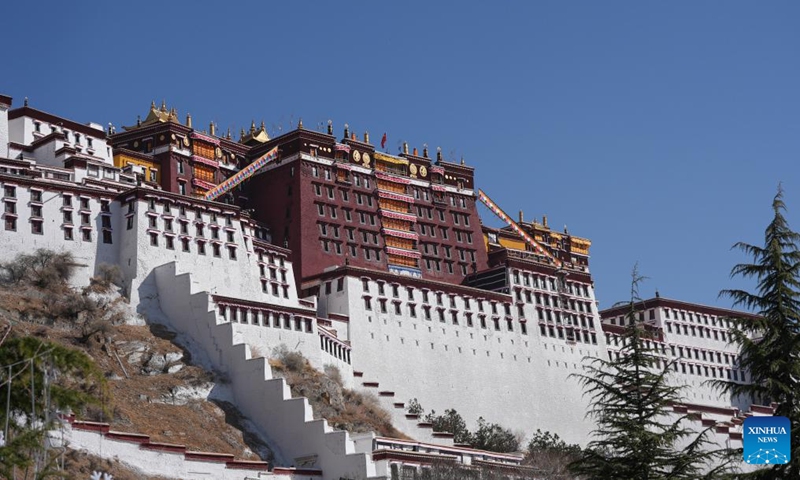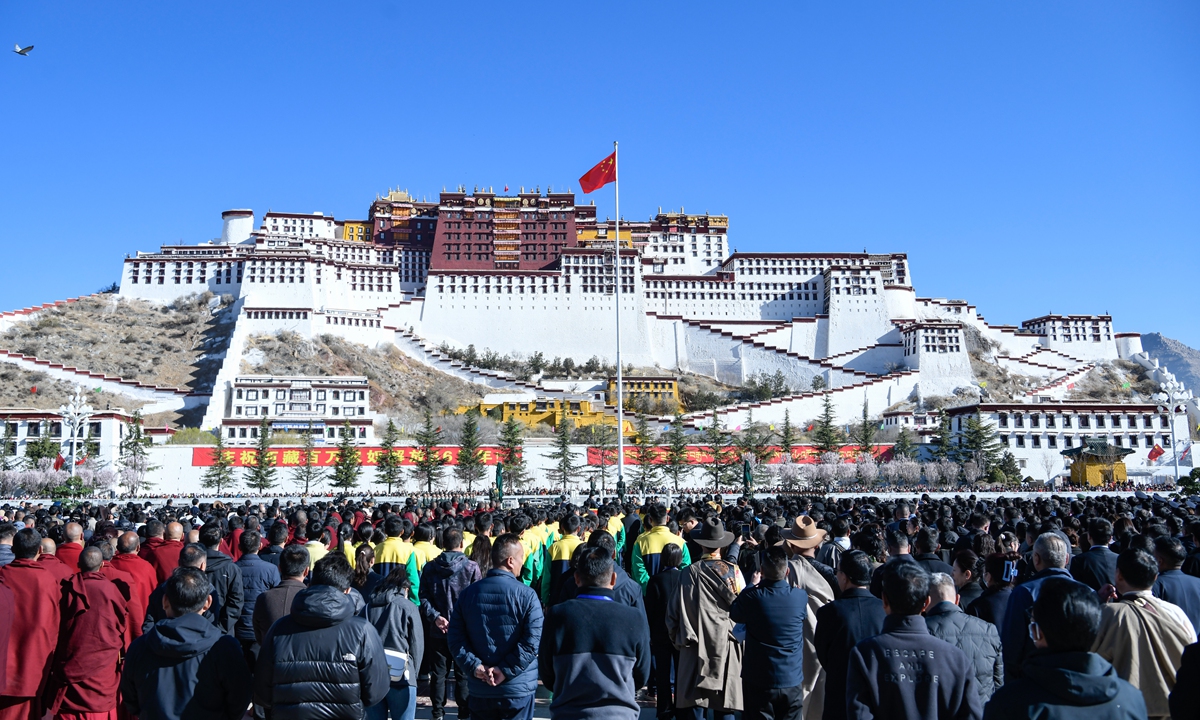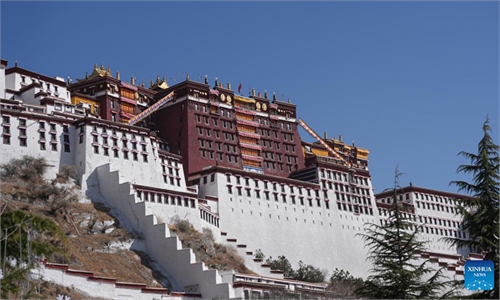
The newly decorated Potala Palace is pictured in Lhasa, southwest China's Xizang Autonomous Region, Feb. 28, 2025. (Xinhua/Jigme Dorje)
All-round and historic progress has been made in human rights cause in Southwest China's Xizang Autonomous Region, according to a white paper released on Friday.
The document, titled "Human Rights in Xizang in the New Era," was released by the State Council Information Office at a press conference held Friday afternoon in Lhasa, capital city of the autonomous region.
The Communist Party of China (CPC) and the Chinese government have always attached great importance to their work related to Xizang, and have constantly refined and expanded their guidelines for governing the region. They have implemented effective measures to develop the economy, improve living standards and people's wellbeing, promote ethnic unity and progress, and protect the basic rights of all the people in the region, it read.
The white paper illustrates the achievements of human rights in Xizang in various fields through facts and statistics.
By the end of 2019, all 628,000 registered impoverished people in Xizang had risen from poverty. In 2024, the per capita net income of those lifted out of poverty in Xizang increased by over 12.5 percent.
Xizang's medical and health service network has now also achieved full coverage. By 2024, Xizang had 7,231 medical and health institutions (including 5,222 village clinics), with 21,551 hospital beds and 29,379 healthcare professionals.
Meanwhile, religious activities are also carried out in accordance with the law in Xizang. Tibetan Buddhism, Islam and Catholicism have coexisted with other religions in Xizang for generations. The region is home to over 1,700 sites for the practice of Tibetan Buddhism and approximately 46,000 Buddhist monks and nuns.
Zhaluo, deputy director general at the China Tibetology Research Center, told the Global Times on Friday that "Western society has long held misunderstandings about human rights in Xizang, and some people have formed prejudices influenced by Western media reports. The release of the white paper can help the international community objectively understand the true situation of human rights protection in Xizang, eliminating misconceptions and biases."
In past years, certain Western media outlets have been tarnishing Xizang's development by raising concerns over issues such as the use of boarding schools in the region.
The white paper released on Friday refuted such claims by explaining that in 2012, Xizang led the entire country in providing 15 years of publicly-funded education from kindergarten to senior high school.
Boarding schools play a vital role in providing education to children from remote farming and pastoral areas, where accessing schools can be challenging due to the high altitude, harsh natural environments, extremely low population density and long distances. Students and parents can choose to board at schools, and students can go home during weekends and holidays, the document stated.
Zhaluo, who also participated in the drafting of the white paper, explained that the white paper summarizes the characteristics, difficulties, and key areas of past human rights protection work in Xizang, while also laying a foundation for improving the level of human rights protection in the future. "This paper's release helps clarify the direction for the future of human rights protection in Xizang, making its path more defined."
The white paper also indicates that as Xizang's social and economic progress advances, the key areas of human rights protection need to continuously expand, and the level of protection must be steadily enhanced, said Zhaluo.

People attend a flag-raising ceremony to celebrate the Serfs' Emancipation Day at the square in front of the Potala Palace in Lhasa, capital of Southwest China's Xizang Autonomous Region, on March 28, 2025. Photo: VCG
Celebrating a happy life
Friday also marks the 66th anniversary of the democratic reform that ended feudal serfdom in Xizang. In March 1959, people in Xizang launched the democratic reform that ended the region's feudal serf system, freeing a million serfs.
According to a Xinhua report, multiple grand celebrations and commemorative activities were held across the region of Xizang on Friday to mark the day, painting a vivid picture of Xizang's human rights progress.
In Lhasa, people of all ethnic groups and walks of life gathered at the Potala Palace Square to raise the national flag, sing the national anthem and participate in the commemoration of the 66th anniversary of the liberation of millions of serfs, the China News Service reported.
Puciren, an 81-year-old who was born a serf in old Xizang, has lived a happy life since the liberation of the serfs. On Friday, he delivered a speech about his experiences to students at the Lhasa Vocational School. "I feel it's my responsibility to tell young people that our life is worth cherishing. The development of Xizang can withstand the scrutiny of the world," he told the Global Times on Friday.
Cona, located in the south of Xizang, witnessed celebratory performances with singing and dancing, and the local government shared this joy through a live video broadcast, the Global Times learned from the local government.
85-year-old Metog, who currently lives in a government-run nursing home, said she has no worries about food or clothing and is in good health. "Under the current policies, our lives are very happy, and everyone has spacious and bright rooms," as shown in a video provided by the Cona government.
Gama Cedain, chairman of the people's government of Xizang Autonomous Region, said on Thursday during a speech to mark the 66th anniversary of the democratic reform that abolished feudal serfdom in Xizang that the abolition of feudal serfdom in Xizang is not only a significant milestone in the region's social development and human rights progress, but also a monumental leap in the history of human civilization and global human rights, according to the Xinhua News Agency.



